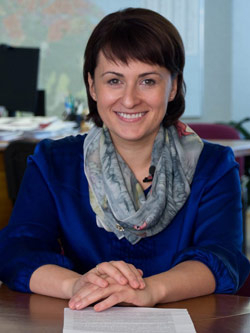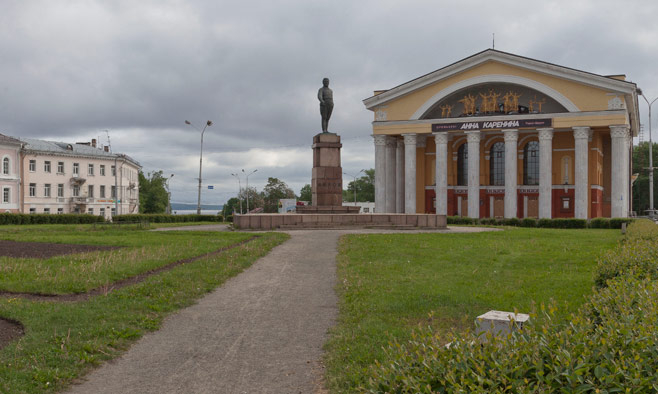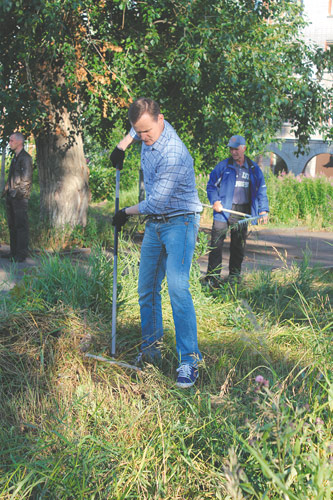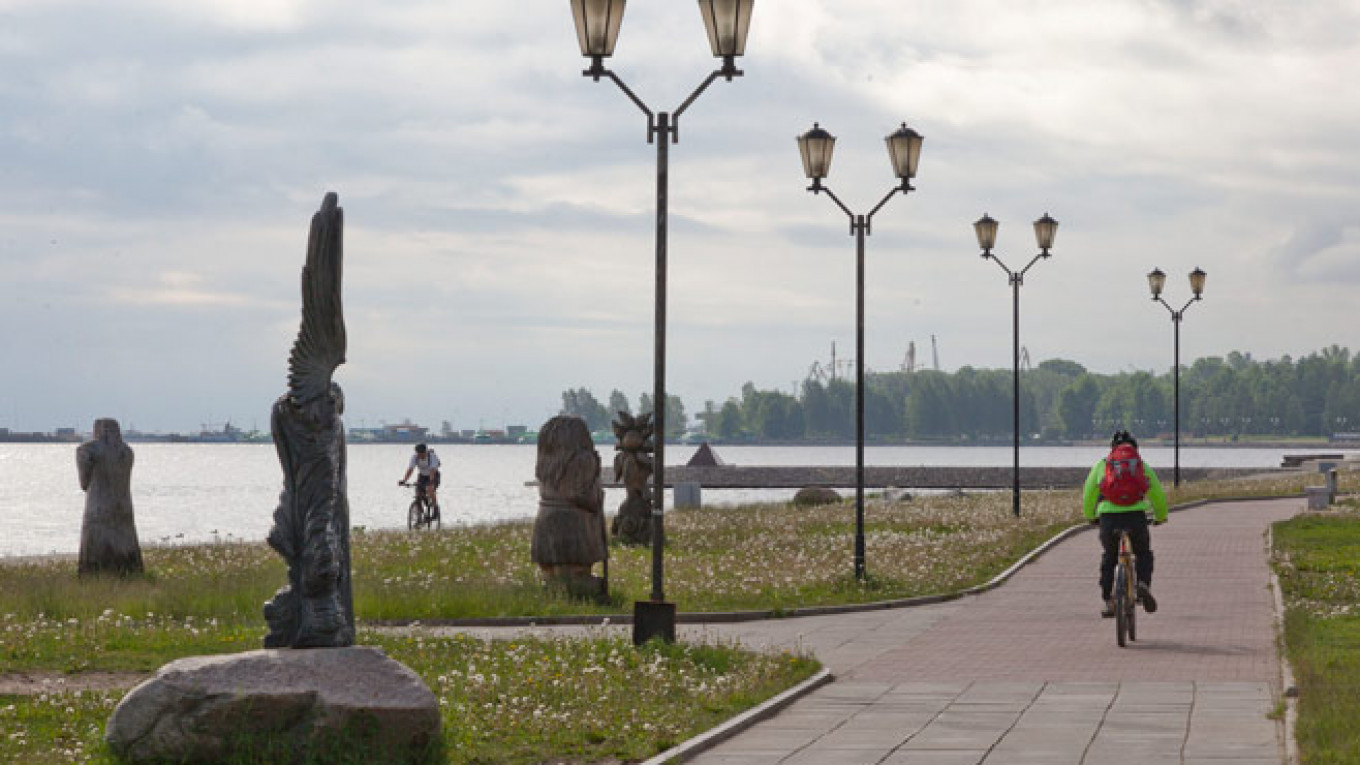In an office building in Russia's northern city of Petrozavodsk, chance encounters between representatives of the mayor's office and the local legislature who share the building are avoided at all costs.
Petrozavodsk, capital of the republic of Karelia, is one of very few Russian cities with an elected mayor — Galina Shirshina — who is not from the ruling United Russia party. Together with prominent anti-drugs campaigner Yevgeny Roizman, who was elected mayor of Yekaterinburg, she is one of the rare opposition candidates to win the mayoral elections of 2013, despite the authorities' best efforts to push forward United Russia candidates.
Canceling Mayoral Elections: A Hot-Button Issue
Galina Shirshina is not alone in her conviction that Petrozavodsk should continue holding mayoral elections.
In addition to her veto, Petrosovet faces a judicial obstacle, owing to a complaint filed earlier this month with the region's highest court by a pair of Communist lawmakers.
The first hearing in the case, which was held last Tuesday, inspired hope in Alexander Stepanov, the deputy that initiated the suit.
“Petrosovet rushed this decision because elections scare them,” he told The Moscow Times on Wednesday. “But there is precedent for the Supreme Court overturning a law that has already passed, so I’m optimistic,” the lawmaker added.
Stepanov made clear, however, that he did not challenge Petrosovet's decision in a bid to do Shirshina any favors, noting that she does not have his political backing. Rather, he is motivated by his belief that city residents should have the right to choose their leader.
Fifteen venerated citizens of Petrozavodsk, most of them veterans of the Great Patriotic war, also expressed their disagreement with the decision, which they referred to as “antidemocratic, unjustified and contrary to the interests of Petrozavodsk's 260,000 residents,” in a letter to Petrosovet's chairman Gennady Bondarchuk.
One of them, prominent local architect Vyacheslav Orphinsky, told The Moscow Times that the matter should be determined via a referendum, and said he personally considered Shirshina a great mayor.
“She tolerates criticism very well,” he said. “I'm a member of a council established by the city administration, and she always listens to what I have to say, no matter how harsh it is,” he added.
Now, in a pattern seen playing out in other cities around the country, the pro-Kremlin local legislature has moved to squeeze out its independent mayor by voting to cancel mayoral elections and replace them with a system in which municipal deputies appoint one from a list of candidates chosen by a special commission.
This tactic has become common practice in other parts of Russia since President Vladimir Putin signed a law allowing the regions to scrap direct gubernatorial elections just a year after they were reintroduced in 2012, in what critics said at the time was a measure aimed at sidelining opposition candidates. But in Petrozavodsk, a city of about 270,000 people, this tried-and-tested technique hit something of a stumbling block a week ago when Shirshina used her right to veto changes to the city charter to shoot down the measure.
Petrozavodsk is a small, industrial city built on the shores of Lake Onezhskoye. Its main thoroughfare, Ulitsa Lenina, connects the two key points of almost every post-Soviet city center — the railway station and the local administration building. The streets of Petrozavodsk are lined with three- to five-story buildings, most of which are dated, but in good repair. The streetlights dotting the city are currently being replaced — a product of Shirshina's latest initiative.
The attempt to cancel mayoral elections was the culmination of a long-standing confrontation between Shirshina and Petrosovet, the legislative assembly of Petrozavodsk, in which most deputies belong to the United Russia faction.
In early June, Petrosovet presented Shirshina with a yearly evaluation of her work, which it declared "unsatisfactory." The lawmakers were unhappy with what they saw as dirty streets, and they felt that Shirshina's administration had mishandled the allocation of apartments to orphans, and of land to pensioners and other residents eligible for state benefits, the TASS news agency reported at the time.
That same month, Petrosovet introduced an amendment to the city charter to the Karelia parliament canceling mayoral elections in Petrozavodsk for good. The regional legislative assembly passed the law — and Shirshina deployed her veto.
"They can overturn my veto, of course," Shirshina, a slender brunette with a guileless smile, told The Moscow Times in an interview in her office last week. "They want Shirshina out. I feel that. You don't have to be a psychic to see it," she added, laughing.
It was clear just from chatting with Shirshina that she is a unique force in Russian politics. Her tone was lively and confident, and she never passed up an opportunity to tell a joke or share a laugh. She stood in stark contrast to most politicians, who tend to embrace vagueness and heavy-handed use of bureaucratic language.

Petrozavodsk Mayor Galina Shirshina is a unique force in Russian politics.
Under local legislation, two "unsatisfactory" yearly evaluations give deputies the right to initiate the mayor's dismissal. But the media has speculated that Petrosovet plans to try to get rid of her as early as the upcoming fall. It's a textbook case of the ruling elite trying to get rid of an opposition administration head who doesn't fit into their system, observers say.
"I'm genuinely interested in how they're going to try to dismiss me in September," Shirshina said with a smile.
Dark Horse
Shirshina, 36, was an independent candidate in the 2013 election race supported by the liberal Yabloko party. At first she served as a reserve for Emilia Slabunova, Yabloko's number one choice for the race. But Slabunova, accused by the city court of numerous violations during her campaign, was eventually banned from taking part in the elections, and Shirshina had to step in.
In a surprise victory, she won 41.9 percent of the vote — 13 percent more than her main opponent, incumbent mayor Nikolai Levin of United Russia.
"It was a protest vote," Mikhail Sedykh, a political analyst, told government newspaper Rossiiskaya Gazeta at the time.
Sedykh said that people voted for the opposition to express their anger because Levin made too many mistakes right before the elections, such as replacing a local park with a parking lot and demolishing a historic building in the city center that had previously functioned as a children's clinic.
"I voted for her because she was not from United Russia," said Marina Molchun, a student in Petrozavodsk. "It's a good thing to have competition among candidates," she told The Moscow Times on Tuesday.
Shirshina, who moved to Petrozavodsk as a child from the neighboring Murmansk region, was an unlikely winner: She was not a politician and was therefore not well-known. She had previously taught psychology at the local university, and right before diving into the mayoral campaign, she ran a publishing house. Her only connection to politics was helping train participants in several electoral campaigns launched by Yabloko.
"I never wanted to pursue a political career. But a managerial position [like that of mayor] appealed to me," Shirshina said, adding that she had believed in her victory from the very beginning, because "there's no point in working on something you don't believe in."
Unconventional Decisions
Business as Usual in Petrozavodsk
Sergei Avishev, chairman of the Karelia Business Association, told The Moscow Times in a phone interview Wednesday that Shirshina's time in office has done little to rouse Petrozavodsk's largely sluggish business climate.
“In general, business in Petrozavodsk is suffering the same stagnation as everywhere in Russia,” he said. “A lot of companies have had to shut down and there hasn't been much development,” he added.
Though Avishev readily admitted that the mayor herself is not to blame for the state of the business sphere, he asserted that the city administration could have done more to support Petrozavodsk's entrepreneurs.
As an example, he said that though the administration has traditionally earmarked subsidies to support small- to mid-sized businesses in the area, this year's budget for that purpose — which he pegged at 2 million rubles ($33,330) — is too paltry to achieve much..
There are no new investment projects, and the number of small businesses involved in trade has decreased significantly, Avishev said, noting that a lot of business owners simply cannot afford to rent municipal spaces.
“This year, with the help of Petrosovet, we managed — albeit with great difficulty — to lower rental rates to the level [they had been at prior to the economic crisis]. But the City Hall should have come up with the initiative, not us,” Avishev said. “In some Russian cities the rates were decreased in order to keep entrepreneurs from leaving [municipal property], and to keep money coming to the budget,” he told The Moscow Times.
All in all, there appears to be a dearth of willingness on the official level to actively develop entrepreneurship in Petrozavodsk, Avishev concluded.
Shirshina's first act as mayor of Petrozavodsk — and the second story to make the national headlines following the news of her victory — was to cancel the inauguration ball.
"To be honest, at first I thought the inauguration had some sort of legal purpose. But when I found out that there was no purpose at all, except for the sake of it …" Shirshina shrugged. "Who needs it? I didn't. City residents didn't," she said.
The New Year's party for City Hall employees met the same fate: It was canceled to save budget funds.
Shirshina also opened up access to the weekly meetings of the Petrozavodsk administration to city residents.
"Not many of them actually come, because we usually hold the meetings on Monday mornings, when everyone's at work," she told The Moscow Times, adding that it has become easier in general to reach city officials since she took office.
"It's really important for me to make the residents realize that they are the masters of the city," Shirshina said.
With rumors circulating that she lived in an ordinary apartment and drove an inexpensive car, the media portrayed her as the kind of official Russians dream of: humble, not there to steal and capable of making reasonable decisions.
Her most notorious policy was to reduce the flat-rate trolleybus fare in the city from 17 rubles ($0.30) to 10 rubles ($0.18).
"We had to do something to make people start using the trolleybuses again. We had to do something to make people like them," because the transport company was on the verge of bankruptcy, she told The Moscow Times.
It wasn't the easiest decision, she admitted. "It was scary. For the first few weeks [after the move] I drove around the city looking at the trolleybuses, trying to figure out how many people were using them," she said.
According to Shirshina, the price slash helped to pull the company out of debt and away from bankruptcy, prompting more people to use the trolleybuses and pay the fare. It was popular with city residents, too.
"Of course I support her, she's the people's mayor — she let us ride the trolleys for just 10 rubles!" Piotr Filimonov, a young Petrozavodsk resident, told The Moscow Times on Wednesday.

Petrozavodsk is known for the neo-classical architecture, with some of its buildings dating back centuries.
'Cheap Politics'
But it didn't last forever. At the beginning of this year — 18 months after the new fare was introduced — Petrosovet put a stop to what its chair Gennady Bondarchuk described as an experiment.
"They [Petrosovet deputies] refused to approve a [44 million ruble] subsidy from the budget we had already planned to give the company. We had the money, but they decided to use it for other purposes," said Shirshina.
Shirshina says that Petrosovet has changed a lot since Bondarchuk, a member of United Russia, became its chair in February this year. "With the arrival of the new chairman, the very ideology of Petrosovet changed," she said.
In an interview with The Moscow Times in his office, Bondarchuk said that instead of improving the transport company's finances, reducing the trolleybus fares had only driven it closer to bankruptcy.
"I didn't hear much admiration for this decision. People actually laughed at it [because it was economically unviable]," he said on Tuesday.
Bondarchuk said that the city is practically in ruins, and that it's all Shirshina's fault.
"The city is in a catastrophic condition," he said. "It's not being cleaned, it's not ready for the heating season. The municipal services are not ready to keep the streets clear [of snow] during the winter," he said, adding that the blame lies with City Hall, which he said was undergoing a serious "management crisis."
"We're going to advise the administration head [Shirshina] to stop her engagement in cheap politics and to try to get more involved in things that matter to the city," Bondarchuk added.
He claimed that Petrozavodsk residents were in support of the decision to cancel mayor elections, because they didn't want to risk having an incompetent mayor like Shirshina head the city once again.
"[Her veto on the decision] is pure sabotage," he said angrily. "Basically she vetoed the law of the Karelian republic, under which the elections are canceled. The law states that we have to change the city charter in accordance with it, so her vetoing those changes means she vetoes the law, which is absurd," he added.
Consensus No Option
"I can only laugh when they [Petrosovet deputies] say that canceling the mayor elections is about 'having to' correct the city charter in accordance with the republic's law," Shirshina said. "It was their initiative to pass this law in the republic's parliament, but now they 'have' to change the charter?" she scoffed.
'No Conflict Is Constructive'
As would be the case with almost any conflict, Shirshina's confrontation with Petrosovet is harmful to the city and contrary to the interests of its residents, said Anatoly Tsygankov, head of the Center of Sociological and Political Research, a Karelia-based think tank.
“Conflicts can at times be constructive,” he told The Moscow Times on Sunday, citing as an example: “a fight for funds between the city [administration] and the regional authorities, where each party stands to benefit."
But within the city, the analyst believes, cooperation between different branches of government is imperative.
“This conflict [between Shirshina and Petrosovet] will be extremely difficult to resolve, because it isn't purely economic or purely social — it's mostly political. The positions [of both parties] are too different and don't concur with one another, so it might be impossible to come to an agreement,” he said.
According to Tsygankov, Shirshina is more likely to back down at this point than Petrosovet because she is in a comparatively weak position. The lawmakers don't have to worry about their own elections until next year, and in the meantime they can push Shirshina out with a vote of no confidence, he said.
The timing of the latter scenario would be tough to predict, the analyst said, but in early September — when Shirshina is set to introduce a report to the deputies about her administration's progress in fulfilling the recommendations she received along with the “unsatisfactory” evaluation — Petrosovet will have a strong pretext for it.
There is no reason to deprive the people of Petrozavodsk of their right to elect a mayor, Shirshina said.
"People here are good at making choices, they're smart and educated. They know how — and like — to ask questions and engage in discussion, and they don't understand why they were denied [this opportunity] for no reason," she said.
As to the numerous problems Bondarchuk said the city was facing, Shirshina said she was perfectly aware of them and that the issues she inherited from the previous administration were not easy ones to resolve. "[That's why] I don't have time for politics — I need to prepare [the city] for the upcoming heating season, for the school season," she said.
She admitted there is much to be done: infrastructure needs modernizing, more kindergartens need to be opened, the streetlight system needs replacing and most buildings need to change their gas supply system.
But Shirshina insists she has already accomplished a lot. "We don't have any violations recorded regarding budget spending, which Petrosovet refused to believe," she told The Moscow Times. "We significantly reduced the budget deficit, too," she added.
"We do our best to open at least one new kindergarten every six months. We've started replacing the streetlight system, which was a disaster before. We've launched a whole series of large-scale cultural events [to boost tourism]," the mayor said.
Her differences with Petrosovet, she said, are rooted in their attitudes to work. "We have a very different understanding of how work should be done. … Their pretense of working hard [instead of doing real work] is sickening," Shirshina said.
"They claimed my work was unsatisfactory, when the figures in my report proved the opposite, and they were revised by our Audit Chamber before I submitted the report to Petrosovet," she said.
Petrosovet's chair Bondarchuk sees no grounds for compromise. "There's always hope that she will change and right all the wrongs within a month according to the recommendations we gave her [when she received our negative evaluation of her work]," he told The Moscow Times.
But when asked directly what specifically should be done in order to make life better in Petrozavodsk, his response was unequivocal: "The [current] mayor has to go."

Gennady Bondarchuk, the chairman of Petrozavodsk’s local legislature.
The People's Mayor?
According to Bondarchuk, not only is Shirshina incompetent and unprofessional, she is also a protege of Vasily Popov, a well-known Petrozavodsk businessman who fled abroad after being charged with extortion. Bondarchuk alleged that Popov, the informal leader of the regional Yabloko party branch, was behind every step Shirshina took, in order to take advantage of budget funds.
Both Shirshina and Popov have denied the allegations. "Popov did everything in his power to make Shirshina win [the election], but I don't have any obligations to him," she was cited by the Kommersant newspaper as saying last year.
The only reason people believe her to be connected with Popov is because he helped her with a project once when she worked at the university, and it was a widely known fact, said Rudolf Kalinin, Shirshina's university professor and later colleague, the former pro-rector of the Karelia State Pedagogical University in Petrozavodsk.
"I voted for her and I would vote for her again," he told The Moscow Times on Tuesday.
"She does a lot of good for the city, repairs roads and opens new cultural and leisure spaces," he said. "But now she's cornered [by her conflict with Petrosovet]; they're not letting her use the funds or do her job," he said.
Not all the locals agree.
"I can't say I'm very pleased with her," said Alina, a Petrozavodsk resident who asked for her last name to be withheld. "How can you be pleased when the snow isn't cleared away by municipal services and makes it impossible for you to open your front door during winter?" she said.
"But then again, am I in a position to judge her? I'm sure it's hard work, being a mayor," she added.
Several other city residents polled by The Moscow Times couldn't say whether they liked their opposition mayor or not. Most of them said they hadn't noticed any difference in the city, where life goes on, no matter how high the tensions rise in city officials' headquarters.
Contact the author at [email protected]
A Message from The Moscow Times:
Dear readers,
We are facing unprecedented challenges. Russia's Prosecutor General's Office has designated The Moscow Times as an "undesirable" organization, criminalizing our work and putting our staff at risk of prosecution. This follows our earlier unjust labeling as a "foreign agent."
These actions are direct attempts to silence independent journalism in Russia. The authorities claim our work "discredits the decisions of the Russian leadership." We see things differently: we strive to provide accurate, unbiased reporting on Russia.
We, the journalists of The Moscow Times, refuse to be silenced. But to continue our work, we need your help.
Your support, no matter how small, makes a world of difference. If you can, please support us monthly starting from just $2. It's quick to set up, and every contribution makes a significant impact.
By supporting The Moscow Times, you're defending open, independent journalism in the face of repression. Thank you for standing with us.
Remind me later.






